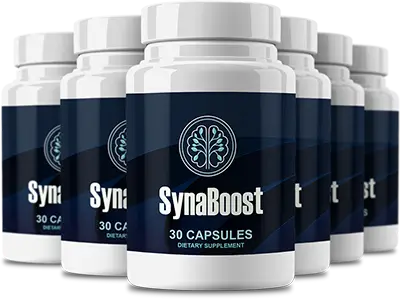| Aspect | Details |
|---|---|
| Type | Plant-based, stimulant-free nootropic blend |
| Key Ingredients | Bacopa monnieri, Huperzine A, Rhodiola rosea, L-theanine |
| Main Benefits | Memory support, enhanced focus, mental clarity |
| Money Back Guarantee | 60-day "ironclad" refund policy |
| Best For | Students, professionals, adults 50+ seeking caffeine-free cognitive support |
An honest look at this plant-based brain supplement that's gaining attention for its stimulant-free approach to cognitive enhancement

SynaBoost isn't your typical brain supplement that's loaded with caffeine and artificial stimulants. Instead, it's built around what the company calls a "plant-based nootropic blend" that focuses on four main botanicals - and honestly, that caught my attention right away since most supplements in this space just throw everything at the wall to see what sticks.
The brand positions itself as something different from the usual "energy drink in a pill" approach. They're targeting people who want clearer thinking without the jitters, crashes, or dependency issues that come with stimulants. It's designed for everyday use rather than those intense study sessions where you're trying to cram three weeks worth of material into one night.
What makes SynaBoost stand out is their bundle approach - you can get it in 1, 3, or 6 bottle packages, with the larger bundles including digital bonuses like "Elixir of Longevity" and "Mind Mastery" guides. Plus, they back it with a 60-day money-back guarantee, which they call "ironclad" (though I've seen plenty of companies use that term, so take it with a grain of salt).
The manufacturing happens in the USA under what they describe as "strict quality standards," though they don't get too specific about certifications. For those looking into natural nootropic supplements, this kind of transparency around sourcing and production is becoming more important.

Here's the thing about nootropics - they're not magic pills that turn you into Bradley Cooper from Limitless. SynaBoost seems to understand this, which is why their marketing focuses on specific groups who might genuinely benefit from this type of supplementation.
Those long study sessions and back-to-back exams can drain your mental energy. SynaBoost offers support without the crash that comes from caffeine-heavy alternatives.
Demanding work schedules and constant decision-making can lead to mental fatigue. The adaptogenic ingredients may help maintain focus throughout busy workdays.
Age-related changes in cognitive function are normal, but ingredients like Bacopa monnieri have research showing potential benefits for memory and attention.
This is probably where SynaBoost shines brightest. If you're someone who gets jittery from coffee or energy drinks but still wants cognitive support, this stimulant-free approach makes sense. I've talked to plenty of people who love the idea of nootropics but can't handle the side effects of most popular options.
The company emphasizes that you should always check with your GP or pharmacist if you're taking medications or have medical conditions - which is standard advice but worth mentioning since some people skip this step. The herbal nootropics space is filled with products that interact with prescription drugs, so due diligence matters.
Experience the power of natural cognitive enhancement with SynaBoost's science-backed formula featuring Bacopa Monnieri, Huperzia Serrata, and other premium nootropics.
If you've spent any time researching natural brain supplements, you've probably come across Bacopa monnieri. It's one of those herbs that sounds exotic but has been used in traditional medicine for literally thousands of years - and more importantly, it's one of the most studied herbal nootropics we have today.
A meta-analysis of randomised controlled trials found that Bacopa can improve certain aspects of cognition, especially speed of attention in adults. What's interesting is that several controlled studies suggest the benefits build up over time with sustained use of a standardised extract - not something you'd notice after taking it once or twice.
Here's what I find interesting about Bacopa - it doesn't work like a stimulant at all. Instead of giving you immediate alertness, it seems to support the underlying processes that help your brain handle information more efficiently. Think of it less like drinking coffee and more like gradually improving your brain's filing system.
May enhance communication between brain cells
Helps protect brain cells from oxidative stress
Supports healthy levels of key brain chemicals
May improve how memories are formed and stored
The catch with Bacopa is that you need to be patient. Most studies showing benefits used standardised extracts taken consistently for 8-12 weeks. So if you're looking for something that'll make you feel sharper tomorrow, this probably isn't it. But if you're thinking about long-term cognitive support, the research is actually pretty encouraging.

Huperzine A comes from a plant called Huperzia serrata, and it's probably the most "pharmaceutical-like" ingredient in SynaBoost. Unlike some of the other botanicals that work in more general ways, Huperzine A has a very specific mechanism - it blocks an enzyme called acetylcholinesterase. Don't worry, I'll explain why that's important.
Acetylcholine is one of your brain's most important neurotransmitters. It's heavily involved in learning, memory, and attention. Think of it as one of the key chemical messengers that helps your brain cells communicate effectively.
The problem is that your body naturally breaks down acetylcholine using an enzyme called acetylcholinesterase. This is normal and necessary, but sometimes you might want to slow down that breakdown to keep more acetylcholine available.
Most of the research on Huperzine A has been done in people with cognitive impairment, not healthy adults looking for enhancement. Small double-blind trials in clinical populations have shown modest improvements in cognitive scores, but we need to be careful about extrapolating these results to healthy people.
That said, the mechanism makes sense for why it's included in nootropic formulations. By helping preserve acetylcholine levels, Huperzine A could theoretically support the cholinergic pathways involved in memory formation and recall. It's just important to have realistic expectations about what this means in practice.
One thing I appreciate about SynaBoost is that they don't make wild claims about Huperzine A. They position it as part of a broader strategy for cognitive support, not as a miracle memory enhancer. This is a more honest approach than you see with many natural nootropic supplements on the market.
Can interact with medications affecting the cholinergic system. Consult healthcare provider if taking prescription drugs.
Don't let brain fog hold you back. Join thousands who have enhanced their cognitive performance with SynaBoost's natural, research-backed formula.
Rhodiola rosea is what researchers call an "adaptogen" - basically a plant that's supposed to help your body deal with stress more effectively. It grows in cold, mountainous regions and has been used traditionally in places like Russia and Scandinavia for centuries. But here's what's interesting: the research on Rhodiola is actually pretty solid.
Randomised trials have looked at Rhodiola in some pretty specific populations - shift-working nurses, people with fatigue and burnout, and students during stressful periods. What they found was reduced mental fatigue and better concentration compared to placebo groups.
This isn't just marketing fluff - systematic reviews have echoed these effects, which gives us more confidence that there's something real happening here.
What I find compelling about Rhodiola is that it seems to work best when you're actually stressed or fatigued. It's not necessarily going to make you superhuman when you're already feeling great, but it might help maintain cognitive function during demanding periods.
In the context of SynaBoost, Rhodiola makes a lot of sense. Mental fatigue is one of the biggest barriers to clear thinking, and if Rhodiola can help counter that fatigue, it could theoretically support the other ingredients in the formula. It's like having a good foundation before you build a house.
I've tried Rhodiola as a standalone supplement during particularly stressful work periods, and I'll be honest - I didn't feel like it turned me into a productivity machine. But what I did notice was that those late-afternoon energy crashes weren't as severe, and I felt more resilient during long work days.
That might not sound exciting, but that anti-fatigue effect can translate into clearer focus during demanding days. It's more about maintaining baseline function than enhancing it dramatically.
The nice thing about Rhodiola is that it's generally well-tolerated and has been used safely for a long time. Unlike some of the more aggressive nootropics out there, it's unlikely to give you side effects or interact with most medications (though as always, check with your healthcare provider).

Reduced mental fatigue
Stressful periods, demanding work
Effects may be noticed within days to weeks
Generally well-tolerated
Rhodiola may work better during stressful periods than when you're already well-rested and relaxed.
L-theanine is probably the most "user-friendly" ingredient in SynaBoost. It's an amino acid that comes from tea - particularly green tea - and it's been studied extensively for its ability to promote what researchers call "calm alertness." Unlike the other botanicals that might take weeks to show effects, L-theanine can work within hours.
Here's what makes L-theanine interesting from a neuroscience perspective - it increases alpha-wave activity in your brain. Alpha waves are associated with a relaxed but alert mental state. Think of the feeling you get when you're completely focused on something you enjoy, without any anxiety or distraction.
Trials in healthy adults have linked single doses of L-theanine to better attention, faster reaction times, and improved working memory during cognitive tasks. What's particularly neat is that these effects happen without any sedation - you stay alert while feeling calmer.
Smooths out the edge from stimulating compounds
Reduces anxiety that can interfere with cognitive tasks
Helps maintain sustained attention without jitters
In a stimulant-free formula like SynaBoost, L-theanine serves a slightly different purpose than it would in a caffeine-containing supplement. Instead of smoothing out caffeine jitters, it's helping create that optimal mental state where the other ingredients can work most effectively.
I've used L-theanine both on its own and in combination with other nootropics, and it's honestly one of the most reliable ingredients I've tried. The effects are subtle but noticeable - you don't feel "high" or dramatically different, but there's a definite sense of calm focus that makes it easier to work through complex tasks.
What I particularly like about L-theanine is that it doesn't seem to have tolerance issues. You can take it regularly without needing to increase the dose or cycle off it. Unlike stimulants, theanine's effects feel smooth and sustainable over time.
| Compound | Alertness | Calming Effect | Tolerance Risk |
|---|---|---|---|
| L-Theanine | High | Moderate | Low |
| GABA | Variable | High | Moderate |
| Magnesium | Neutral | Mild | Very Low |
In the context of natural nootropic supplements, L-theanine is kind of the perfect "supporting actor." It doesn't steal the show, but it makes everything else work better by creating the right mental environment for focus and clarity.
Provides immediate calming focus while the other ingredients build their effects over time. Creates an optimal mental state for cognitive enhancement.